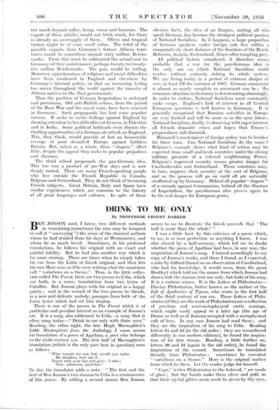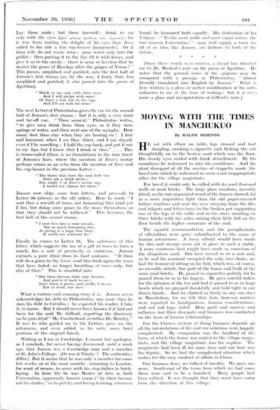DRINK TO ME ONLY
By PROFESSOR ERNEST BARKER
BEN JONSON used, I fancy, two different methods in translating (sometimes the wise may be tempted to call it " conveying .") the sense of the classical authors whom he had studied from his days at Westminster, and whom he so much loved. Sometimes, in his professed translations, he follows his original with an exact and painful fidelity. But he had also another way which is far more stirring. There are times when he simply takes his cue from the Latin or Greek original, and then lets his own Muse soar, as if he were writing what the musicians call " variations on a theme." Thus, in the little collec- tion called The Forest, there are two poems to Celia, which are both, in a sense, translations from two lyrics of Catullus. But Jonsou plays with his original in a happy gaiety ; and in the second of the two poems he blends, in a new and delicate melody, passages from both of the Latin lyrics which had set him singing.
There is one of the poems in The Forest which is of particular and peculiar interest as an example of Jonson's art. It is a song, also addressed to Celia—a song that is often sung toilay—" Drink to me only with thine eyes." Reading, the other night, the late Hugh Macnaghten's Little Masterpieces from the Anthology, I came across his translation of a poem of Agathias, a poet who belongs to the sixth century A.D. The first half of Macnaghten's translation (which is the only part here in question) runs as follows
"Wine tempts me not, but, would you make • Me drunken, here am I.
Touch with your lips and give : I take; Now, soberness, good-bye."
10 this the translator adds a note. " The first and the best of Ben Jonson's two stanzas to Celia is a reminiscence of this poem. By adding a second stanza Ben Jonson seems to me to illustrate the Greek proverb that "Fire half is more than the whole' " I was a little hurt by this criticism of a poem which, to me, is as near perfection as anything I know. I was also stirred by a half-memory, which led me to doubt whether the poem of Agathias had been, in any way, the inspiration of Jonson's song. I turned accordingly to my copy of Jonson's works, and there I found, as I expected, a note by Gifford (based on an observation of Cumberland, who had his knowledge, it would seem, from the great Bentley) which told me the source from which Jonson had drawn both the stanzas (not one only, but both) of his- song. It is a curious source. It is the Letters of Philostratus- Flavius Philostratus, better known as the author of the Life of Apollonius of Tyana, who wrote in the first half of the third century of our era. These Letters of Philo- stratus (if they are the work of Philostratus) are a collection of precious and semi-metaphysical erotic musings, which might easily appeal to a later age (the age of Donne as well as of Jonson) occupied with a metaphysical cult of love. In any ease Jonson had read them ; and they are the inspiration of his song to Celia. Reading letters 2-t and 25 (in the old order : they are renumbered differently in our modern editions), he found the inspira- tion of his first stanza. Reading, a little further on, letters 30 and Si (again in the old order), he found the inspiration of - the second. Sometimes he translated literally from Philostratus ; sometimes he executed "-variations on a theme." Here is the original matter from which he drew. Let the reader judge for himself.
" Cups," writes Philostratus to the beloved, " are made of glass ; but thy hands make them silver and gold, -so that their crystal glitter must needs be riven by thy eyes. Lay them aside ; bid them farewell ; drink to me only with the eyes Ozoi peOms- vinh-i re Toi3 (7p acre) ; for it was from tasting the delight of his eyes that Jove called to his side a fair cup-bearer [Ganymede]. Or if thou wilt, do not waste wine ; pour water only into the goblet ; then putting it to thy lips fill it with kisses, and give it so to the needy : there is none so loveless that he desires the grace of Bacchus after the grapes of Venus ! " This passes, simplified and purified, into the first half of Jonson's first stanza (as, by the way, I fancy that, less simplified and purified, it also passed into the poem of Agathias).
" Drink to me only with thine eyes, And I will pledge with mine : Or leave a kiss but in the cup, And I'll not look for wine."
The next Letter of Philostratus gives the cue for the second half of Jonson's first stanza ; but it is only a very faint and far-off cue. " Thou seem'st," Philostratus writes, " to give men drink from thine eyes, as if they were springs of water, and thou wert one of the nymphs. How many dost thou stay when they are hasting on ! I first and foremost, when I see thee, thirst, and I am stayed, even if I be unwilling : I hold the cup back, and put it not to my lips, but I know that I drink of thee." . . This is transcended (there is no translation) in the four finest of Jonson's lines, where the mention of Jove's nectar perhaps comes as an echo from the mention of Jove and his cup-bearer in the previous Letter :
" The thirst that from the soul cloth rile Doth ask a drink divine ; But might I of Jove's nectar sup, I would not change for thine."
Jonson now skips some four letters, and proceeds to Letter 30 (always in the old order). Here he reads " I sent thee a wreath of roses, not honouring thee (and yet I do), but doing some grace to the roses themselves: so that they should not be withered." This becomes the first half of the second stanza.
" I sent thee late a rosie wreath, Not so much honouring thee, As giving it a hope that there It could not withered be."
Tinally he comes :to Letter 31. The substance of this letter, which suggests the use of a gift of roses to form a couch, has a sort of preciosity of eroticism. Jonson extracts a pure elixir from its final sentence. " If thou wilt do a grace to thy lover, send him back again the roses that have faded, no longer breathing of roses only, but also of thee." This is ennobled into
"But thou thereon didst only breathe.
And sent'st it back to me: Since when it grows, and smells, I swear, Not of itself, but thee."
What a curious and amazing story it is. Jonson never acknowledges his debt to Philostratus, any more than he does his debt to Catullus : he expected his reader, I take it, to know. But I should never have known if it had not been for the acid Mr. Gifford, reporting the discovery (as he puts it) of " Mr. Ctunberland, or rather Dr. Bentley." It was he who guided me to the Letters, gave me the references, and even added, in his note, some brief portions of the original Greek.
Writing as I am in Cambridge, I cannot but apologise, as I conclude, for never having discovered, until a week ago, that Jonson was a Cambridge man and a member Of St. John's College. (Or was it Trinity ? The authorities differ.) But it seems that he was only a member for some few weeks, or at the most months—returning to London, for want of means, to serve with his step-father in brick- laying. In later life he was _Master of Arts in • both Universities, apparently honoris (wawa (" by their favour,; not his studies," as he put it) ; and loving learning. wherever found, he honoured both 'equally. His dedication of his Volpone—" To the most. noble and most equal sisters, the two famous Universities "—may well supply a toast for all of us who, like Jonson, are debtors to both of the sisters.
[Since these words were written, a friend has directed me to Dr. Mackail's note on the poem of Agathias. He notes that the general sense of the epigram may be compared with a passage in Philostratus, " almost literally translated into English by Jonson." What is here written is a gloss or rather modification of his note, unknown to me at the time of writing ; but it is even more a gloss and interpretation of Gifford's note.]





























































 Previous page
Previous page